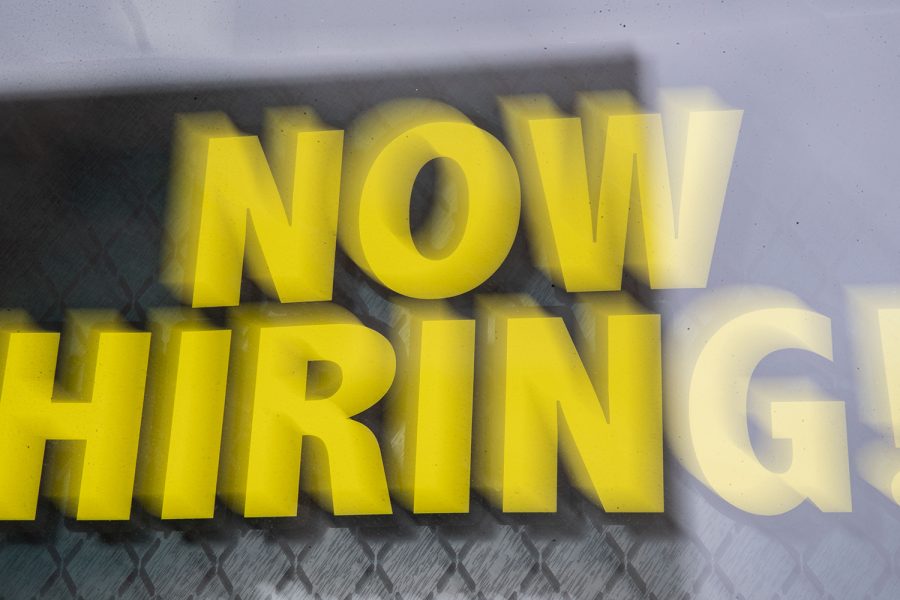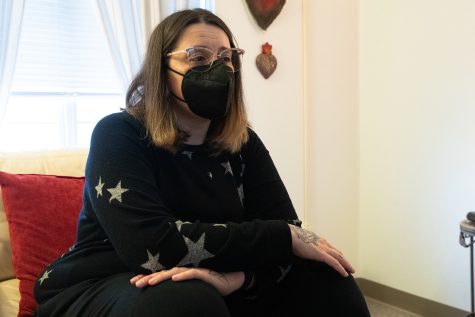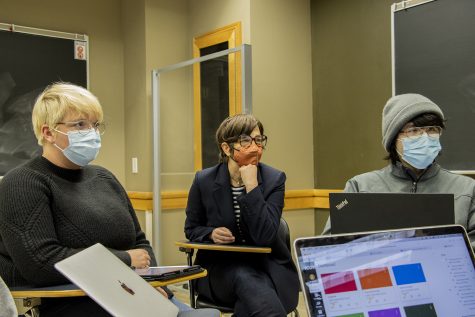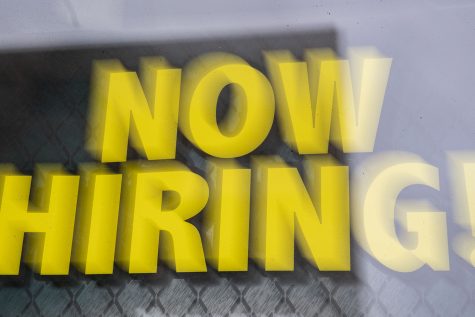Iowa City still recovering from the financial impact of COVID-19, officials say
A now hiring sign is displayed at the future location of The Stuffed Olive and Tap on the Ped Mall on Thursday, March 24, 2022.
For the last two years, Iowa City government and local businesses have contended with the financial impacts of COVID-19.
More than two years after Johnson County identified Iowa’s first case of COVID-19, Iowa City officials have worked to reduce the financial impact of the pandemic on the local economy.
Businesses and the local government saw drastic shifts in operations, cost, and revenue when COVID-19 first entered the city.
Iowa City City Councilor Janice Weiner said she saw a broad impact on the city early in the pandemic, with parking services, city transit, and water fund payments all seeing losses.
Some of the impacts to industries, such as Iowa City Transit, continue to this day. Weiner said the city’s transit ridership remains around 60 percent of pre-pandemic totals.
“In the middle of a pandemic, the very last thing you want is for anyone to lose access to water when they can’t afford it,” Weiner said.
Early on, Weiner said city officials used funds they had placed aside to try to revitalize Iowa City businesses. She said bars and restaurants were heavily impacted because of shutdowns and restrictions.
As Iowa City residents settled into the pandemic, she said the takeout business increased and consumers were keen to visit restaurants, especially to eat outside, beginning in summer 2020.
“Parks and Rec moved a lot of picnic tables out of parks and into the downtown area, especially for the spring, summer, and fall period, so that more people could eat outside,” Weiner said.
The city also looked to help small businesses by providing grants, Weiner said, especially for businesses run by people of color.
Downtown commerce changes
Nancy Bird, executive director of the Iowa City Downtown District, said the pandemic drastically impacted the downtown district over the first few months, with several locations going out of business.
She said consumer behavior changed during the pandemic, resulting in a shift to online activity like to-go orders.
Businesses in the district, Bird said, had to adapt over the past two years, opening channels for online ordering to keep consumers’ business.
Data visualization by Ryan Hansen/The Daily Iowan
Some of the money that was in the district in the past, however, has gone to larger competitors, she added.
“A lot of the money that may have once been in the local market has departed through Amazon,” Bird said. “Behavior change, re-inviting people downtown — which I think is happening — are things that we’re going to be working on.”
Businesses in the downtown area were given funding through multiple channels between the local, state, and federal levels, Bird said, including loans provided by the Paycheck Protection Program, which allowed businesses to apply for federal money to sustain and help to move their business forward.
“There were PPP loans, there were a number of grants that were offered locally to support these businesses and venues during the height of the pandemic,” Bird said. “That funding was used to help support keeping employees and investments back into the business.”
According to federalpay.org, Iowa businesses received a combined $8.1 billion from the federal Paycheck Protection Program, part of Congress’s first COVID-19 relief package.
Bird said the pandemic provided businesses, and the entire district, with the opportunity to evolve by accelerating processes like the shift to online ordering and more widely available patio seating.
“We’re evolving out of this and learning from it and coming out on top, better than we were before,” Bird said.
Iowa City Finance Director Nicole Davies said several city departments saw revenue reduction, but the impact to the city as a whole was not massive.
The city incurred unexpected costs through the purchase of personal protective equipment, such as masks, Davies said. Cleaning costs increased in some areas, she said, but was offset by less frequent cleaning in the city buildings that were closed.
“Our parking ramps are cleaned, but then there would have been cost-saving in some other areas,” Davies said. “There’s cleaning done at our rec centers, but they were closed for a good portion [early in the pandemic].”
She added that the city’s businesses were provided with the opportunity for loans out of the $2 trillion federal Coronavirus Aid, Relief, and Economic Security Act.
Additional funding for the city came from the American Rescue Plan Act, though Davies said the City Council has only spent a small portion of the federal money as of March 2022.
Weiner said the city’s focus with its spending during the pandemic has been to provide relief to residents. Supplementing a federal moratorium on evictions which ended in 2021, Weiner said the City Council channeled funds through local resources such as the Shelter House and the Center for Worker Justice.
Weiner said the council is providing these organizations with additional funding to aid those unable to pay rent or utilities.
“The focus has been, to the extent we can, to help keep people whole, [and] make sure that they don’t lose their water, to make sure that they keep going,” Weiner said. “I hope that we will reap some of the benefits of that as a community of people who care for each other.”





